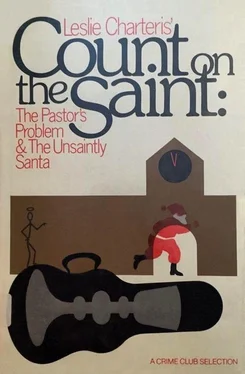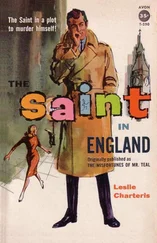The Saint perched on the edge of the leather-topped desk and glanced at the papers spread across it. They were mainly the heavier dailies plus a scattering of financial publications.
As he had not had a chance to read the morning papers, he selected one at random and began to flick idly through the pages. A column on the front page given over to the murder of Wakeforth and the Santa Claus link with the murder of Lazentree related that there had been no fresh developments. Inside the Saint found little to interest him, but he noted that the contents had certainly been of interest to someone, presumably Nyall.
In both the political and financial sections certain paragraphs, and in some instances whole stories, had been ringed in blue pencil. Political unrest in one of the South American banana — or in this case coffee — republics, news of a drought in West Africa, and conversely of a flood in East Africa, were marked, as were a feature article on the effects of strikes in United States copper mines and a speculative piece on the size of the following year’s cocoa bean harvest.
Simon put the paper down and stood up. As he did so a photograph hanging on the wall near the desk caught his eye, and he walked over and studied it more closely. It showed a dozen soldiers in tropical kit standing and sitting in what appeared to be a jungle clearing. The men had the grim, weary eyes of seasoned soldiers in wartime which overshadowed the smiles they had offered the cameraman. Neither the location nor the date nor the identities of those shown was given but despite the years that had passed since its taking there was no mistaking Godfrey Nyall. He stood in the centre of the group, his slouch hat pushed back off his forehead, leaning on the barrel of his rifle. The soldier was slimmer, straighter, and harder than the man he had grown into, but there was the same strict look about the eyes and the same purposeful chiselling of nose and mouth. Simon looked for signs of his rank and found none. His companions also wore no indication of their status, which made the Saint even more curious. There was an explanation nagging at the back of his memory but refusing to formulate itself.
He was still puzzling over the picture when the door opened and he turned to greet the bursar.
“I’m sorry to have kept you waiting,” said Nyall. “Have you found out anything more about the murder of Sir Basil?”
“Only that he was due to meet Stanton Wakeforth at 3:30 p.m. today,” said the Saint, finally deciding that the time had come to make use of the clue he had found in the store tycoon’s diary. “Do you know why?”
Nyall’s brow furrowed and he slowly shook his head.
“He told me nothing about it,” he replied at length. “I didn’t even know they were acquainted. But then unless it had some direct bearing on St. Enoch’s funds there would have been no reason for me to be informed.”
“I take it that you are responsible for the college coffers,” said the Saint.
“Of course, it is my main responsibility,” Nyall answered as he went behind his desk and sat down. “We are not a wealthy college like some others in Cambridge, but there are still substantial amounts involved.”
“Mainly government grants, bequests, donations, that kind of thing?” Simon hazarded.
“Mainly,” Nyall agreed. “But there are investments to be considered as well.”
“Stocks and shares, you mean?”
Nyall’s lips broke in a brief, almost patronising smile.
“Nothing exciting, I’m afraid. Mainly long-dated government bonds, gilts, a small portfolio of some of the blue chip companies,” he said dismissively. “We can’t afford to be gamblers.”
The Saint nodded.
“No, I suppose not. Will Sir Basil’s death affect the finances at all?”
Nyall tidied up the papers and placed them in a pile on one side of the desk while he replied.
“No, I should think not, at least in the short term. Of course, he was a well-known man, and a figurehead always helps to make a college better known generally and so leads to more donations.”
There was a rap on the door and Dr. Burridge entered. He looked uncertainly from Nyall to the Saint.
“Good morning, Mr. Templar. I’m sorry, Godfrey, I didn’t realise you were busy. I’ll return later.”
“Don’t go on my account,” said the Saint, who had glimpsed Chantek crossing the courtyard outside. “I was just about to leave anyway.”
It was nearly the truth and the sight of Chantek had made it so. Within the college walls he felt unnaturally cramped, and although there were still questions he wished to ask he would prefer to put them on his own or neutral ground.
“I was wondering,” he continued pleasantly, “if you gentlemen could have lunch with me. Perhaps you would also invite Professor Darslow and Professor Rosco. Since you invited me to apply myself to the recent goings-on, I’ve had some more thoughts which might be worth kicking around.”
Both men looked at each other as if hoping the other would make the first refusal. The Saint could sense that neither found the invitation over welcome but both appeared at a loss for a plausible excuse. He looked at his watch and saw that it still needed a few minutes to noon.
“Shall we say one o’clock at my hotel?” he asked.
Nyall nodded mutely. Burridge’s voice was strained.
“That is very kind of you.”
“I hope you’ll still think so this afternoon,” said the Saint cordially.
He caught up with Chantek on the far side of the quadrangle.
“What have you been doing?” she asked eagerly.
“Just nosing around,” he said evasively. “I found some circumstantial evidence, which is notoriously unreliable. So I won’t confuse you with it in advance. Meanwhile, you are invited to lunch.”
He explained who would be there, and Chantek looked as uneasy at the prospect as Burridge and Nyall had done. She did not relish the idea of being surrounded by those who had seemed like demigods for most of the year. But the Saint brushed aside her fears and after making her promise not to be late drove back to the University Arms.
He felt as if he had already done a full day’s work, and welcomed the reviving properties of a shower and a change of clothes. He was unhappily contemplating the imminent obligation to select a necktie when the telephone rang.
The voice on the other end of the line was brisk and businesslike.
“Mr. Templar?”
Simon admitted his identity and enquired that of his caller.
“My name is Casden. Brian Casden. I run a company called Happy Time Toys.”
“Sounds like fun,” said the Saint.
Casden ignored the interpolation and continued: “I understand you are investigating the murders of Sir Basil Lazentree and Stanton Wakeforth.”
“You could say I’m slightly involved,” the Saint admitted guardedly. “Why?”
There was a lengthy pause before the question was answered, and then Casden’s voice sounded strained.
“I think I may be next.”
Simon Templar frequently found his reputation a hindrance. Fame, he sometimes felt, brought with it more problems than an already overworked outlaw should reasonably be asked to contend with, and he could become wistful for the days when only a small privileged band of fellow adventurers had known his baptismal name, and the world outside heard only of a mysterious figure who passed like an avenging wraith across the paths of the unrighteous.
But notoriety also had its advantages. Fate had obligingly delivered him to the right spot at the correct o’clock, but the aura surrounding his name had done much of the rest. Without it, Superintendent Nutkin might have treated him with less undeserved suspicion and more civility and thereby not invited him to puncture the detective’s pomposity. Without it, Godfrey Nyall would not have approached him and he would not so easily have made the acquaintance of the St. Enoch hierarchy. And without it Brian Casden would not have telephoned and held out a possible solution to the mystery.
Читать дальше












